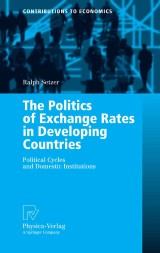Details

The Politics of Exchange Rates in Developing Countries
Political Cycles and Domestic InstitutionsContributions to Economics
|
96,29 € |
|
| Verlag: | Physica-Verlag |
| Format: | |
| Veröffentl.: | 21.09.2006 |
| ISBN/EAN: | 9783790817164 |
| Sprache: | englisch |
| Anzahl Seiten: | 258 |
Dieses eBook enthält ein Wasserzeichen.
Beschreibungen
1. 1 The context What factors determine a country's exchange rate regime? Since the col lapse of the Bretton Woods system of fixed exchange rates in 1973, eco nomists have been increasingly interested in answering this question. Ana lysts focused primarily on the possible influence of optimum currency area (OCA) criteria, such as a country's size, openness to trade, or factor mobi lity. More recent approaches emphasized the nature and the sources of shocks to which an economy is exposed or explicitly took imperfections on financial markets into account. However, despite a large body of work, litt le consensus has emerged about the determinants of exchange rate regime choice. The existing empirical literature could not identify a single variable as a clear predictor of exchange rate regime choice and even among eco nomically comparable countries large discrepancies in exchange rate pol icy have been observed (see, e. g. , the survey on the literature in Juhn and Mauro 2002). The inconclusiveness of traditional approaches to explain exchange rate regime choice is the stimulus for this dissertation. My main point is that political and institutional conditions help to account for differences in ex change rate policy. Li other areas of economic policy, it has become stan dard to argue that government's macroeconomic preferences are an impor tant determinant in economic policymaking and should not be neglected when analyzing macroeconomic outcomes.
General introduction.- The normative and the positive view on exchange rate policy.- Fear of floating and fear of pegging: How important is politics?.- Political uncertainty and speculative attacks.- Developing a theory of currency peg duration.- The determinants of fixed exchange rate regime duration: A survival analysis.- Political cycles and the real exchange rate.- Conclusion and discussion.
<P>This book considers the issue of exchange rate policymaking from a political economy perspective. It illustrates both theoretically and empirically how domestic political and institutional incentives shape exchange rate policies in developing countries. Modelling policymakers’ preferences as endogenous, the book answers questions as the following: What influences the relative value that a country puts on fixed versus floating regimes? Why do governments, during certain episodes, deviate from an officially announced exchange rate regime? How do policymakers’ exchange rate preferences change during election periods? The empirical analysis is based on a panel survey of 47 countries and thereby provides insights on how political and institutional conditions typically affect exchange rate policy.</P>
Includes supplementary material: sn.pub/extras


















